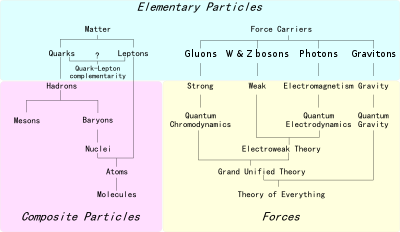Hardcover
In physics, a bound state or bond state is a combination of two or more bodies or particles that behave like a single object. The demarcation can apply to the state in which a single (elementary or composite) particle is removed from the others ( free ), or also to the case in which all parts of the whole are removed from one another ( disperse ). A bound state is generally stable, i.e. a steady state with an infinite lifetime.
In quantum mechanics (if the number of particles is retained) the bound state is a state in Hilbert space , which corresponds to two or more particles whose interaction energy is negative. Therefore the particles cannot be separated as long as no energy is used. This energy needed to break the bond is called the bond energy . In contrast to the continuous spectrum of individual particles, the energy levels of the bound state are discrete .
In general, a stable bound state can exist in a potential if there is a standing wave function . The energies of these wave functions are negative.
There are also unstable bound states with positive interaction energy. This is possible when there is an energy barrier that needs to be tunneled through for decay . This is the case for some radionuclides in their ground state and in general for many excited states of atomic nuclei .
In relativistic quantum field theories , a bound state with n particles of mass m 1 ,…, m n appears as a pole in the S matrix with a mass that is smaller than m 1 +… + m n ( mass defect ). An unstable bound state (see resonance ) presents itself as a pole with a complex center of gravity.
Examples
- A proton and an electron can move independently of each other; as a whole, they then have positive energy. However, if they form a bound state under the influence of the Coulomb force , the hydrogen atom , the energy becomes negative. Only the state with the smallest (i.e. most negative) energy, the basic state , is stable. All other, excited states are unstable and decay into the ground state. This emits photons .
- An atomic nucleus is a bound state of protons and neutrons .
- A positronium atom is an unstable bound state of an electron and a positron . It breaks down into (mostly) two photons.
- The proton is a bond state of three quarks (two up and one down ); each quark has the quantum chromodynamic color red, green or blue. In contrast to hydrogen, the individual quarks can never be separated (see confinement ).
Mathematical structure in quantum mechanics
Let be a complex separable Hilbert space , let be a one-parametric group with unitary operators on and be a statistical operator on . Let be an observable on and the induced probability distribution of in relation to on Borel algebra on . The development of induced by is bound in relation to called when , where .
Example: Let and the position observable. Be with a compact carrier and .
- If the development of the state “moves the wave packet constantly to the right”, e.g. B. If for all , then there is no bound state in relation to place.
- If does not change over time, e.g. B. for everyone , then there is a bound state in relation to the place.
- More generally: If the time development of " only moves within a limited area", then it is a bound state related to the place.
Individual evidence
- ^ Albert Messiah: Quantum Mechanics . Walter de Gruyter, 1991, ISBN 3-11-011452-6 , p. 358 ( limited preview in Google Book Search).














![{\ displaystyle [-1,1] \ subseteq \ mathrm {Supp} (\ rho)}](https://wikimedia.org/api/rest_v1/media/math/render/svg/e1472182fd8c4bd0367c816390467ad4e4acf002)
![{\ displaystyle [t-1, t + 1] \ in \ mathrm {Supp} (\ rho (t))}](https://wikimedia.org/api/rest_v1/media/math/render/svg/b8a023bcdb013a464203036f2a31376e5840cda8)

